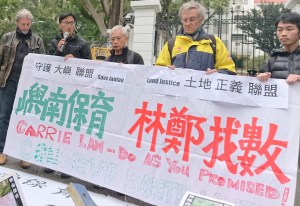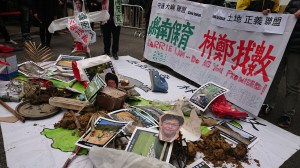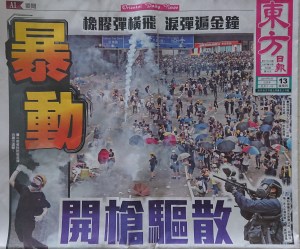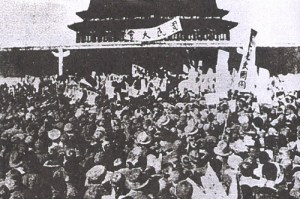Category: HK politics

A defensive Carrie Lam vows to press on with Lantau Tomorrow
The government’s much-criticised scheme to build a massive new business and housing district on 1700ha of reclaimed land in waters off Lantau is certain to go ahead.
In her annual policy address on Wednesday chief executive Carrie Lam vowed to proceed with the plan, currently estimated to cost HK$624 billion, making it the easily most expensive public works project in the city’s history.
The Legco Finance Committee, now dominated by pro-government members, began considering approval for the initial HK$550 million funding on Friday.
But in her speech Lam struck a defensive note, calling on people “to act in an objective and fair manner with the long-term interests of Hong Kong in mind”
This is a departure from her government’s longstanding claim of wide public support for the scheme.
Lam also vowed to “continue to listen to the views of various sectors of the community,” despite having rejected widely-held criticisms about the cost, the necessity and the ecological risks posed by the project.

Source: Sustainable Lantau Office
Even pro-government legislators are querying it, with more than 20 lodging questions about the project. They are also determined not to appear in a rush to approve the funding application, scmp.com reports.
One pro-Beijing lawmaker, Wong Kwok-kin, a member of Lam’s cabinet, complained about the public backlash they will face for voting for Lantau Tomorrow.
Appearing before Legco on Friday, Development Secretary Michael Wong faced questioning about the cost and viability, the likelihood of delays, and protection of country parks.
“We can’t issue a blank cheque and just allow you to proceed with the study and all the steps subsequent to it. We need to be careful about every penny spent,” Priscilla Leung Mei-fun, of the Business and Professionals Alliance according to scmp.com.
Wong was also asked whether reclamation was a better option than building in country parks, which account for around two-thirds of SAR land.
He said there was little support for building in parks and that it would take additional legislation.
But in a comment that carries some significance for Lantau residents, Wong downplayed the second phase of the scheme, which envisages a 700ha reclamation around Hei Ling Chau, just off Mui Wo.
Without elaborating, he described the initial phase of 1,000 ha reclamation around Kau Yi Chau as the “real” component of the project, and the second 700 ha phase of Hei Ling Chau as “virtual.”
Tom Yam of the Citizens Task Force for Land Resources has accused the government of “magical thinking” in believing the project would help solve short-term housing needs and that it will be ready by 2033.
Yam points out that government’s own forecasts anticipate the city’s population to start falling from a peak of 8.1 million from 2041.
He said the government had already identified 1400 ha in land from brownfield sites in the New Territories, while land developers had warehoused a further 1000ha.
Subscribe to Lantau News Updates. Send a Whatsapp to +852 98172089 with the message ‘subscribe’. Make sure to add the number to your contacts.

Passive HK govt waiting to hear from Beijing on new Lantau reclamation
The Hong Kong government has taken a passive stance toward calls for a huge reclamation off south Lantau, with Development Secretary Michael Wong saying it won’t commit either way without a “concrete proposal.”
Replying to a Legco question from pro-government legislator Alice Mak last week, Wong said he was aware of discussions about creating land for Hong Kong through reclamation in mainland China waters.
But he said the government would not take a position on suggestions – mostly from DAB politicians – to reclaim land around the island of Guishan, in mainland waters about 5km off Lantau’s most southerly point.
“In the absence of a more concrete proposal, the government is not in a position to make specific response at the moment,” Wong said.
The Guishan scheme is reportedly under consideration by Beijing as a means of adding to the land supply and helping kick-start the Hong Kong economy.
But Wong’s reply suggests that the government is either waiting for mainland officials to come up with a proposal, or that it would not make any move until given some direction by Beijing.
Wong adds that the government is open to “suggestions that could help relieve the land shortage,” but also makes it clear that it has no thought of taking action itself.
This continues a pattern seen in other major public works such as the HK$119 billion HK-Macau bridge, the HK$83 billion West Kowloon rail terminus and the HK$624 billion Lantau Tomorrow Vision, all driven strongly by Beijing.
The Guishan reclamation scheme was raised by DAB members during the recent NPC session in Beijing.
Pro-Beijing politicians and others since offered multiple ideas on how Guishan could be developed.
At a recent roundtable discussion, Leung Che-cheung, Legco member for New Territories West, which includes Lantau, pointed out that the unpopular Lantau Tomorrow scheme has not even been funded and would take at least a decade to complete, Ming Pao reported.
He said Guishan could provide 1,000 hectares of land, enough to accommodate 200,000 households and house new industries.
Tony Tse, the Legco member for the architecture sector, said Guishan could be a site for public housing and university facilities and prisons. Its position in the centre of the Greater Bay Area meant the Kwai Chung container terminal could be relocated there.
Despite its location far from any urban area, Guishan advocates have not spent much time discussing transport arrangements.
Leung said the island would be just “20 minutes” away from Central by high-speed ferry. He also called for construction of a connecting bridge from Guishan to the Hong Kong-Zhuhai-Macao Bridge, 20km away.

Govt in last-minute bid to fund Lantau Tomorrow project
The government is making a last-minute bit to win approval for the contentious Lantau Tomorrow Vision reclamation ahead of the Legco election.
Its funding request has been squeezed into the Legco finance committee agenda this Friday – the last sitting day ahead of the September 6 poll.
The government is seeking HK$550.4 million for a consultancy study into site evaluation around Kau Yi Chau and to examine transport infrastructure needs for stage one of the project.
It is the initial funding for a scheme forecast to cost HK$624 billion for the first stage alone — the city’s biggest ever construction project.
But the project is widely unpopular because of its cost and scale, the weak case for it and the presence around the city of many other white elephant public works such as the HK-Macau bridge.
The request, initially filed last year, was not voted on as a result of the democrat filibuster. It was foreshadowed by Development Secretary Michael Wong in his blog two weeks ago and then reappeared on the finance committee agenda early this week, surprising legislators and and media.
But approval seems a long way from being assured. Finance committee chair Chan Kinpor admitted to Oriental Daily yesterday it was unlikely to be passed.
Liberal Party legislator Felix Chung told HK01 last week that in the current political environment the Lantau Tomorrow plan may not be implemented at all.
The government fears it may lost control of Legco in the coming election. Pro-democracy groups overwhelmed government parties in last year’s district council election, and a primary among pro-democracy candidates on the weekend attracted more than 600,000 voters – equivalent to a fifth of total participation in the 2016 election.
Pro-Beijing parties have started to push an alternative, smaller scale reclamation on Guishan Island off southern Lantau.
Stage one of Lantau Tomorrow involves creating a 1200 ha artificial island around Kau Yi Chau, with freeway and rail links connecting to Lantau and Hong Kong islands.
A second stage, which is not part of this feasibility study, envisages creating another 500ha artificial island around Hei Ling Chau and Sunshine Island off Mui Wo.

Have your say on Hong Kong: vote in this weekend’s democrat primary
Forget the security law: here comes the election – and you the voter can play your part.
The 2020 Legco election is scheduled for September 6, with some democrat activists calling the most critical election in our lifetimes. That may be hyperbole.
But they are also saying that the new security law may make this the last where candidates are not screened for their political sympathies. Probably not hyperbole.
To maximise their chances, and to fly the flag for the democratic process, the pro-democracy camp will hold a primary this weekend to choose its candidates for the Legco poll.
The primary is open to all registered voters. You just need to bring your Hong Kong ID card and proof of address to the voting station.
With the drama over the security law, it is easy to forget that the democrat forces obliterated the pro-Beijing parties in last year’s District Council elections,
Thanks to an energised electorate and a huge voter registration drive, they tripled their number of seats and took control of every district council (except ours).
With that sort of turnout, democrats believe they have a strong chance of winning control of Legco.
Of course, the communist party forces have been struck by the same thought, which is one reason they rushed through the new security law.
In any case, elections and electioneering are still legal, especially a privately-held one like this, organised by a group called Power for Democracy.
The voting is simple but the background is a bit complicated, because Hong Kong’s electoral system is designed that way. Here’s a brief explainer.
The Legislative Council (Legco) has 70 seats: 35 geographical seats of the kind you find in a regular democratic system, and 35 functional constituency seats that you don’t find anywhere else. A functional constituency is a business or sectoral seat, like agriculture and fisheries, Heung Yee Kuk or education.
It’s no secret that Beijing officials created the functional constituencies to shore up their monopoly on power. It has worked so far; democrat parties have always won the popular vote and pro-CCP parties have dominated the FC vote.
Right now the pro-democracy camp holds 24 seats; that number was 30 after the 2016 election, but the government found a way to disqualify six members.

In this weekend’s primary, every Lantau voter gets two votes:
* the local seat, known as New Territories West.
* the so-called district council ‘superseat’, technically known as the District Council (Second) Seat.
In Hong Kong’s system of multi-member constituencies, NT West returns nine members. The democrat parties currently hold six and don’t believe they will win enough votes to take a seventh. But eight democracy groups, known as ‘lists,’ are competing, so they are seeking your help in whittling that down to six. Choose just one list.
The ‘superseat’ is open to sitting district councillors from all over Hong Kong (there is another district council FC in which councillors themselves vote). Again, your job is to choose just one candidate or list.
That’s it. Happy voting.
AT A GLANCE
What: Pro-democracy camp primary election
When: 9am-9pm, July 11-12
Where: Mui Wo: 8 Ngan Kwong Wan Rd, opposite Ngan Wan Estate Block 3.
Tung Chung: G/F Ying Fook House, Ying Tung Estate (July 11 & 12)
Fuk Yat House, Yat Tung Estate, open area (July 11); Tung Chung Town Centre Bus Terminal (July 12)
Bring: Hong Kong ID plus proof of address (eg, utility bill)
Further information & donations: Power for Democracy Facebook page


Tung Chung station may not open Monday in wake of protestor attack
Tung Chung station and a number of other MTR stations may remain closed Monday after protestors vandalised machines and equipment today.
Following attacks on 32 stations across the city on Saturday evening, 12 MTR stations sustained damage today.
MTR Corp. described the damage as “very severe” and, without providing any detail, said some stations may remain closed Monday.
It said in the incidents on Sunday, which also included Tsing Yi, Tsuen Wan and Lai King stations that “people damaged CCTVs, ticket issuing machines and add-value machines, took away fire extinguishers and defaced stations.”

Tung Chung was one of the worst hit.
In doubtless the most violent day in the suburb’s short history, protestors arrived late in the afternoon as they retreated from the airport, building barricades and lighting a bonfire on Chek Lap Kok en route.
MTR Corp said it had had to close the Airport Express because of people entering the track and throwing stones and steel bars onto the tracks.
The protestors entered Tung Chung station and attacked ticket machines, sprayed graffiti and flooded the floor with water.

Some entered the Station Control Room, forcing staff to evacuate, MTR Corp said.
By the time police arrived in force at around 6:30pm most had departed.
Many were reported walking on the freeway towards Sunny Bay and the toll booth, where according to social media posts they were picked up by private vehicles.
Citigate mall and Fu Tung Plaza closed down following the incident, while local bus services were terminated at North Lantau Hospital.
Numbering about 200, riot police made a brief patrol around the MTR station before departing at 7:45pm.

MTR Corp said following the damage caused on Saturday night, Prince Edward and Mongkok stations were closed for repairs on Sunday morning while Kowloon Bay did not open until 4pm.
‘Riot’: How the Hong Kong press covered June 12
Newspapers may not be the force they used to be but the way they handle big stories is still revealing.
Following an extraordinary day in Hong Kong yesterday, let’s see how the main papers covered it.
Main headline: Riot
First up is the Oriental Daily News. Its editors deserve a certain recognition for this powerful front page, even though it is, to be frank, quite misleading.
May 4, June 4 and other whiplash
Now we’ve despatched the organisers of an illegal student-led demonstration, let’s celebrate May 4.
For those not familiar, the May 4th Movement began as a protest against the unfair Versailles Treaty and became a genuine social revolution.
Like the Occupy and 1989 democracy movements, the students of 1919 took to the streets in defiance of an official ban. As with the later protests, it failed in its immediate aims but the spirit and ideology lived on. Continue reading

(EXPLAINER) The by-election and Lantau
Q: What did we learn from the Sunday by-election?
It’s been widely interpreted as a defeat for the pan-Democrats – not least by the democrats themselves, who yesterday publicly apologised to supporters.
They won two of the four seats being contested and remain short of the one-third needed to veto key bills.
Q: So what happened?
For one, it seems the democrat candidates focused too much on ‘DQ’ – the disqualification of legislators that led to the by-elections in the first place. Voters may have been sympathetic but were also looking for a positive reason to vote for the dems.
Edward Yiu, the candidate for Kowloon West, has said he miscalculated by not doing enough door knocking in the housing estates. His campaign was run by Eddie Chu, who triumphed in New Territories West (which includes Lantau) in 2016. But his rural tactics may not have been suitable for the urban areas.
The dems were likely affected by the smaller voter turnout – their vote in the three geographical seats was down ten points or so. It may be voter fatigue, or it may be that localists declined to support moderates like Yiu. The reviews are still underway.
Q: How does this matter for Lantau?
None of the four constituencies directly involved Lantau, but apart from the setback for democratic forces, the result impacts here in a number of ways.
One small point to note is that Bill Tang, who represents Yat Tung North in the Islands District Council, failed in his attempt to win a New Territories East seat. An official with the pro-government HKFTU, he had held the Legco labour functional constituency seat from 2012-16 (no, it’s not clear how someone from Tung Chung gets to stand in NT East.)
More significantly, Lantau will not benefit from the advocacy of Edward Yiu and another candidate Paul Zimmerman, who ran unsuccessfully for the architectural constituency. Both are informed and committed on Lantau development and conservation issues. Zimmerman, for example, has called for changes in the Waste Disposal Ordinance – the law that allows landowners to dump landfill on their wetland plots with the guaranteed approval of the EPD.
Q: What happens next?
For Lantau, the biggest thing on the Legco calendar – quite possibly later this year – will be the request to fund a feasibility study into the East Lantau Metropolis (ELM).
Note this is not a study to examine its economic or financial viability. It will examine the best way to build the ELM, not to question any assumptions.
If approved it will be the first of many requests to tip taxpayer cash into the biggest project in Hong Kong’s history.
The feasibility study too is a record-breaker. The government was seeking approximately HK$250 million before it withdrew the bill after getting caught up in democrat filibustering last year.
Thanks to the DQs and last Sunday’s by-elections, there won’t be any more filibustering.

Lam won’t condemn wetland dumping or amend law to stop it
Chief Executive Carrie Lam has refused to condemn wetland dumping and has ruled out any changes to the law to preserve Lantau and other threatened areas.
Lam admitted in Legco yesterday that there were “loopholes in the law” but said that some “behaviour that looks like it is harming the ecology may not in fact be illegal.”
Lam’s comments, her first on the issue since protestors dumped waste on her doorstep on Sunday, were in response to a question from legislator Eddie Chu, who brandished a toilet seat found in a Pui O landfill.
Chu asked the CE if she would condemn those who “have exploited legal loopholes” to damage Coastal Protection Area land on South Lantau.
He also asked if she would amend the law to ensure its preservation.
Lam declined to answer, but acknowledged there was “room for improvement in monitoring and enforcement.”
She called for stronger public education “to protect our beautiful coastline and other rural areas.”
Lam’s responses fail to distinguish between fly-tipping, which is illegal, and landfilling, which has become government-authorised waste dumping in rural areas.
They also fly in the face of her own policy, which is to conserve South Lantau generally and Pui O wetland specifically.
In her October policy address Lam said Lantau would be conserved by the new Sustainable Lantau Office, based on the Sustainable Lantau Blueprint issued last June.

“Measures for conservation of Pui O wetland are being explored,” it states.
Yet when it comes to ensuring these “treasured” ecosystems can be preserved, Lam not only is unable to offer any “measures” – she cannot find fault with the steady destruction taking place.
It is clear the CE has no intention of taking on powerful rural interests to stop wetlands from disappearing under a mountain of construction waste.

Protestors dump Lantau waste at Govt House, warn of further action
Demonstrators dumped construction waste outside Carrie Lam’s residence today to protest landfilling and wetland destruction, with Legco member Eddie Chu warning of further protests “if the government ignores us.”
The rally of about 30 people marched from Central ferry pier, bringing with them two trolleys filled with waste from South Lantau landfill sites.

Occupying Central
They poured the trash onto the ground at the Government House gate to remind Lam that conserving South Lantau and protecting the wetlands are her own policies.
A police sergeant accepted a petition on behalf of Lam.
A police contingent almost as large as the protest itself watched over the event.

Police presence
Eddie Chu told the demonstrators:
“We will come back if the government does not take the right actions to deal with this dumping issue.
“This is only the first action. There will be actions following if the government ignores us.
“We will not allow this to happen in South Lantau. We are not going to allow it to happen anywhere in rural Hong Kong.”

Paul Zimmerman (left), Eddie Chu (second from left)
Paul Zimmerman, head of Designing Hong Kong and a candidate for the architectural constitutency at the forthcoming by-election, said the government needed to introduce new legislation to protect rural Hong Kong.
“If you want development in Hong Kong you have to give confidence to people that conservation truly is conservation,” he said.
He said landfilling of the kind carried out in rural Hong Kong was “destruction on purpose, to create development value,” to ensure land was already destroyed so it could be rezoned.
But the symbolic waste dumping may come at a cost to the protestors. Organiser Eddie Tse, head of the Save Lantau Allianced said police had warned him he could be fined for dumping the waste.

What a waste


